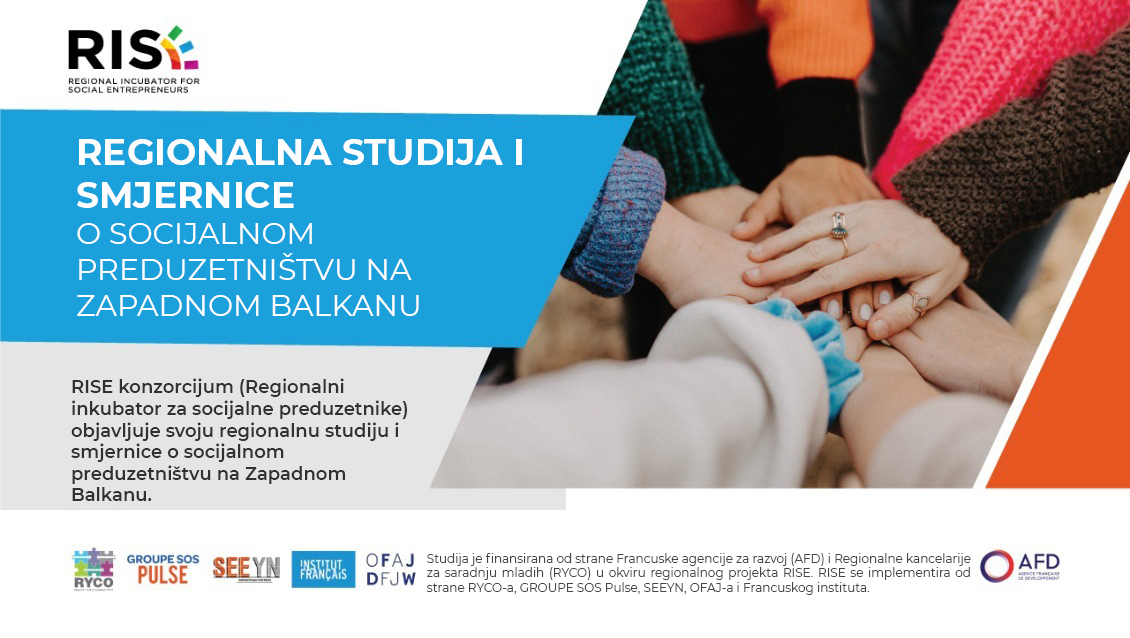Developed and implemented by two researches, Teo Petričević and Jelena Anđelić, and coordinated by the RISE consortium, this document provides up-to-date, relevant and concise information on the current state of social and youth entrepreneurship in the Western Balkans. The document focuses on the policy and legal framework, the education system, financial and non-financial support structures, networking initiatives and new markets for social entrepreneurship in the region.
The document consists of two parts:
- STUDY that provides relevant data on the state of social and youth entrepreneurship in the region in the region, as well as lessons learned from Albania, Bosnia and Herzegovina, Kosovo, Montenegro, Northern Macedonia and Serbia;
- GUIDELINES for the social entrepreneurship ecosystem, CSOs ( civil society organizations) and policy makers, describing the needs and competencies for youth social entrepreneurship, as well as recommendations for action based on the lessons learned from the study. Some of the most significant findings from both parts are:
- 2/3 of the governments of the Western Balkans have not adopted the official definition of social entrepreneurship, as well as special legislation on social enterprises;
- None of the six Western Balkans has a special legal form for social entrepreneurship; they most often operate using the legal form of associations, cooperatives and limited liability companies;
- In each of the six Western Balkans, there are at least three national stakeholders who have designed and implemented specific support programs for youth and/ or social entrepreneurs. Private support structures and programs are still fragile and unsustainable without financial assistance from third parties;
- Across the region, entrepreneurship is being introduced in primary and secondary education programs, and in some cases in tertiary education. On the other hand, these programs ack the goal of developing an entrepreneurial mindset and focusing on the practical application of skills;
- Funding opportunities are most often in the form of grants and start-up capital; even if in one of the six Western Balkans, network of business angels and other private investors are active in the development of entrepreneurship, there are still no solid programs or examples of private investment in social entrepreneurship.
- In most cases, the general pubic does not understand the concept of social entrepreneurship and there are on strategic and specific awareness-raising programs and actions;
- Young entrepreneurs are motivated by a sense of freedom and independence, as well as opportunities to make difference, learn and gain valuable work experience;
- Numerous successful social enterprises can be presented as role models in the regional ecosystem. The study was funded by the French Development Agency (AFD) and the Regional Office for Youth Cooperation (RYCO) as part of the RISE regional project. RISE is implemented by RYCO, GROUPE SOS Pulse, SEEYN, OFAJ and the French Institute.
- * This title is without prejudice to positions on status and is in line with United Nations Security Council Resoution 1244 and the International Court of Justice’s Opinion on Kosovo’s declaration of independence, GROUPE SOS Pulse Regional Youth Cooperation Office-
- RYCE
- SEEYN
- OFAJ DFJW
- AFD- Development Agency
- Balkan Green Foundation
- SMart Collective
- AC “Nešto Više”
- Technopolis
- Innovation and Entrepreneurship Center
- Yunus Social
- Business Balkans
- FRENCH INSTITUTE ARNO

